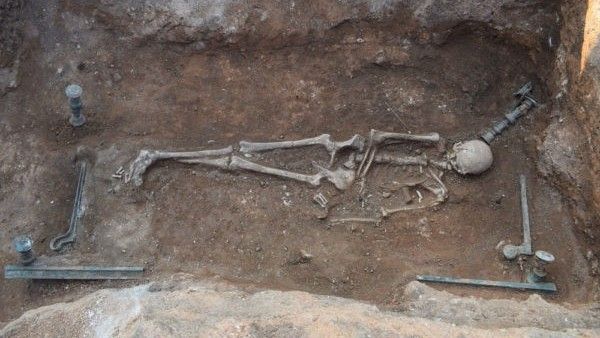Archaeologists have unearthed the ancient burial of a woman lying on a bronze bed near the city of Kozani in northern Greece. It dates to the first century B.C.

Depictions of mermaids decorate the posts of the bed. The bed also displays an image of a bird holding a snake in its mouth, a symbol of the ancient Greek god Apollo. The woman's head was covered with gold laurel leaves that likely were part of a wreath, Areti Chondrogianni-Metoki, director of the Ephorate of Antiquities of Kozani, told Live Science in an email. The wooden portions of the bed have decomposed.
Gold threads, possibly from embroidery, were found on the woman's hands, Chondrogianni-Metoki said. Additionally, four clay pots and a glass vessel were buried alongside the remains. No other people were buried with her.

Archaeologists are now analyzing the skeleton to determine the woman's health, age when she died and possible cause of death. The artifacts found with her suggest that she likely came from a wealthy background, and may have belonged to a royal family.

We do not know much about the history of this area [during the first century B.C.]," Chondrogianni-Metoki told Live Science. Thousands of years ago, Kozani was near an important city called Mavropigi (the site is now a village) that housed a sanctuary dedicated to Apollo, Chondrogianni-Metoki said.
Historical records show that during the first century B.C., Roman control and influence in Greece was on the rise. The Romans destroyed the city of Corinth in 146 B.C. and sacked Athens in 86 B.C. In 48 B.C. a crucial battle in northern Greece known as the Battle of Pharsalus saw the army of Julius Caesar defeat a force led by Pompey; the victory resulted in Caesar becoming the de facto ruler of Rome.
It's unclear when exactly in the first century B.C. this woman lived or if she would have witnessed or heard of any of those historic events. The woman’s remains are currently housed at the Archaeological Museum of Aiani in Greece.
Live Science contacted scholars not affiliated with the research for further insights on the discovery, but none were available to offer comment at the time of publication.
The bronze bed burial was found in 2019. In 2021, another bed burial was found in a nearby cemetery that had an elderly man buried on the remains of a bed made of iron and wood. That burial dated to the fourth century B.C.

 www.livescience.com
www.livescience.com
Depictions of mermaids decorate the posts of the bed. The bed also displays an image of a bird holding a snake in its mouth, a symbol of the ancient Greek god Apollo. The woman's head was covered with gold laurel leaves that likely were part of a wreath, Areti Chondrogianni-Metoki, director of the Ephorate of Antiquities of Kozani, told Live Science in an email. The wooden portions of the bed have decomposed.
Gold threads, possibly from embroidery, were found on the woman's hands, Chondrogianni-Metoki said. Additionally, four clay pots and a glass vessel were buried alongside the remains. No other people were buried with her.
Archaeologists are now analyzing the skeleton to determine the woman's health, age when she died and possible cause of death. The artifacts found with her suggest that she likely came from a wealthy background, and may have belonged to a royal family.
We do not know much about the history of this area [during the first century B.C.]," Chondrogianni-Metoki told Live Science. Thousands of years ago, Kozani was near an important city called Mavropigi (the site is now a village) that housed a sanctuary dedicated to Apollo, Chondrogianni-Metoki said.
Historical records show that during the first century B.C., Roman control and influence in Greece was on the rise. The Romans destroyed the city of Corinth in 146 B.C. and sacked Athens in 86 B.C. In 48 B.C. a crucial battle in northern Greece known as the Battle of Pharsalus saw the army of Julius Caesar defeat a force led by Pompey; the victory resulted in Caesar becoming the de facto ruler of Rome.
It's unclear when exactly in the first century B.C. this woman lived or if she would have witnessed or heard of any of those historic events. The woman’s remains are currently housed at the Archaeological Museum of Aiani in Greece.
Live Science contacted scholars not affiliated with the research for further insights on the discovery, but none were available to offer comment at the time of publication.
The bronze bed burial was found in 2019. In 2021, another bed burial was found in a nearby cemetery that had an elderly man buried on the remains of a bed made of iron and wood. That burial dated to the fourth century B.C.

2,100-year-old burial of woman lying on bronze 'mermaid bed' unearthed in Greece
Gold laurel leaves, likely from a wreath, lay at her head.


